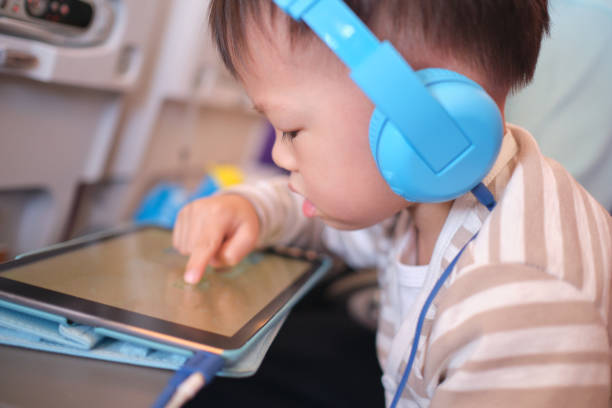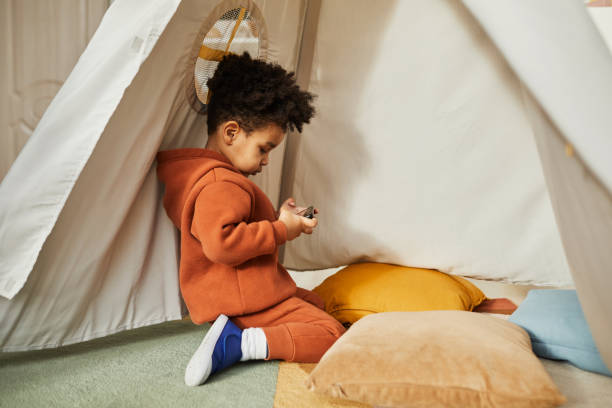Introduction:
Screen Time:
Screen time refers to the amount of time an individual spends interacting with electronic screens, such as televisions, computers, smartphones, tablets, and gaming devices. It includes activities like watching videos, playing games, browsing the internet, and using various applications. Screen time can be passive (such as watching videos) or interactive (such as playing games or using educational apps). The term "screen time" is commonly used in the context of children and refers to the duration of their exposure to electronic screens.
Technology:
Technology encompasses the tools, devices, systems, and applications that are developed to facilitate various activities and improve efficiency in different aspects of life. In the context of screen time, technology refers to the digital devices, software, and applications that provide access to screens and enable various forms of digital interaction. This includes smartphones, tablets, computers, televisions, gaming consoles, and the internet. Technology plays a significant role in our daily lives, offering numerous benefits and opportunities, but it also presents challenges, particularly when it comes to managing its impact on children's development and well-being.
Parenting in the digital age presents new challenges, especially when it comes to managing screen time and technology for babies. As a parenting specialist, I understand the concerns faced by mothers and the problems that can arise from excessive screen time. In this comprehensive guide, we will explore the impact of screen time on babies' development, discuss common issues faced by mothers, and provide practical tips to strike a healthy balance. In today's technology-driven world, digital devices have become an integral part of our daily lives. From smartphones to tablets, screens surround us. However, when it comes to babies, it becomes crucial to navigate the use of screen time mindfully.

Understanding the effects of excessive screen time on babies' development is vital. During the first years of life, babies undergo rapid growth and development, both physically and mentally. This period is critical for their cognitive, language, and social development. However, prolonged exposure to screens at such a tender age can disrupt these essential developmental processes. As a result, mothers of toddlers, face a range of challenges when it comes to screen time. Overstimulation and attention issues are common problems encountered by mothers, as excessive screen time can lead to difficulties with focusing and attention span. Additionally, sleep disruptions and restlessness can occur, impacting a baby's sleep patterns and overall well-being.
To address these challenges, it is essential for parents to set healthy boundaries and establish a balanced approach to screen time. By implementing effective strategies, parents can mitigate the negative effects of excessive screen time and promote healthy development in their babies.
Understanding Screen Time and Its Effects

In today's digital age, understanding the impact of screen time and technology on babies aged 1 to 2 years is crucial for parents. By gaining insights into the effects of screen time, parents can make informed decisions about their child's exposure to digital devices. This section delves into the definition of screen time and explores its effects on babies' development.
1.1: Defining Screen Time and Technology
In this sub-section, we clarify the concept of screen time and technology. Screen time refers to the duration a child spends in front of a digital screen, including smartphones, tablets, computers, and televisions. It is important to establish a clear understanding of what constitutes screen time to effectively manage its impact on babies' well-being.
1.2: Impact on Babies' Development
The second sub-section delves into the effects of screen time on babies' development. During the critical stage of 1 to 2 years, a child's brain is rapidly developing, making it essential to understand the potential consequences of excessive screen time.
Cognitive Development: Excessive screen time can impede babies' cognitive development. It may affect their ability to concentrate, solve problems, and think creatively. Research suggests that interactive, hands-on activities provide more significant cognitive stimulation compared to passive screen time.
Language Skills: Language acquisition is a crucial aspect of a child's development during the first years of life. Excessive screen time may hinder language development by reducing opportunities for verbal interaction, exposure to language-rich environments, and face-to-face communication.
Social Interaction: Screen time can impact babies' social interaction skills. Excessive exposure to screens may limit face-to-face interaction and hinder the development of essential social skills, such as reading facial expressions, understanding social cues, and engaging in cooperative play.
Brain Development: The developing brain of a baby is highly influenced by the experiences and stimuli it receives. Excessive screen time can disrupt the natural development of neural pathways, potentially affecting long-term cognitive abilities and emotional regulation.
Challenges Faced by Mothers

Mothers often face several challenges when it comes to managing screen time for their babies. Being aware of these challenges can help mothers navigate this aspect of parenting more effectively. In this section, we will discuss two common challenges faced by mothers and provide insights on how to address them.
2.1: Overstimulation and Attention Issues
One of the challenges associated with excessive screen time is overstimulation, which can lead to attention issues in babies. When babies are exposed to screens for extended periods, the constant visual and auditory stimuli can overwhelm their developing senses. As a result, their attention spans may shorten, and they may struggle to focus on other activities.
To mitigate these challenges, it is essential for mothers to set limits on screen time and provide alternative activities that engage their babies' senses. By introducing interactive toys, puzzles, or sensory experiences such as exploring different textures or objects, mothers can redirect their babies' attention and promote engagement with the real world. Additionally, creating a calm and distraction-free environment during playtime can help reduce overstimulation and improve attention span.
2.2: Sleep Disruptions and Restlessness
Another challenge that mothers often encounter due to screen time is sleep disruptions and restlessness in their babies. The blue light emitted by screens can interfere with the production of melatonin, the hormone that regulates sleep. When babies are exposed to screens before bedtime, their sleep cycles may be disrupted, leading to difficulties in falling asleep and frequent night awakenings.
To address this challenge, mothers can establish consistent bedtime routines that exclude screen time. Engaging in calming activities such as reading a book, singing lullabies, or gentle massages can help signal to the baby that it's time to wind down and prepare for sleep. Creating a dark and quiet sleep environment, free from screens and electronic devices, can further support the baby's natural sleep patterns.
Tips for Managing Screen Time

3.1: Setting Healthy Boundaries
Setting healthy boundaries is crucial when it comes to managing screen time for babies. By establishing clear limits and guidelines, parents can ensure a balanced approach to technology use. Here are some strategies to help you set healthy boundaries:
Parental Controls: Utilize the parental control features available on digital devices to restrict access to age-appropriate content and limit screen time duration.
Screen Time Limits: Determine a reasonable amount of screen time for your baby and communicate this to other caregivers. Consider using timers or screen time management apps to enforce the limits effectively.
Create Family Rules: Involve your entire family in setting screen time rules. Establish specific times or situations when screen time is allowed and when it should be avoided, such as during meals or before bedtime.
Lead by Example: Be a role model for your baby by demonstrating responsible technology use. Limit your own screen time when interacting with your child and prioritize engaging activities together.
Open Communication: Maintain open and honest communication with your child about screen time boundaries. Explain the reasons behind the rules and encourage dialogue about their experiences and feelings related to technology.
3.2: Encouraging Interactive Play
While managing screen time, it's essential to encourage interactive play to promote your baby's overall development. Interactive play involves activities that engage their senses, foster creativity, and promote social interaction. Here are some ideas to incorporate interactive play into your daily routine:
Interactive Toys: Provide age-appropriate toys that encourage exploration, problem-solving, and imaginative play. Look for toys that promote sensory experiences, fine motor skills, and cognitive development.
Playtime Variations: Create a diverse range of playtime activities that involve movement, music, and hands-on experiences. Activities such as building blocks, puzzles, and shape sorters help develop problem-solving abilities and fine motor skills.
Sensory Experiences: Engage your baby's senses by introducing different textures, colors, and sounds. Activities like water play, finger painting, and playing with safe household objects can enhance sensory development.
Social Interactions: Encourage your baby to interact with other children their age in playgroups or structured play sessions. This helps develop social skills, cooperation, and empathy.
Parent-Child Bonding: Participate actively in your baby's playtime. Get down on their level, talk, sing, and engage in activities together. This not only strengthens the parent-child bond but also enhances their emotional well-being.
Alternative Activities and Parent-Child Bonding
4.1: Outdoor Play and Nature Exploration
Encouraging outdoor play and nature exploration is essential for babies aged 1 to 2 years. It provides them with opportunities to engage their senses, develop gross motor skills, and foster a connection with the natural world. Here are some ideas to make the most of outdoor playtime:
-
Create a Safe Outdoor Space: Designate a secure area in your backyard or visit local parks with age-appropriate play equipment. Ensure the environment is childproofed and free from potential hazards.
-
Sensory Experiences: Let your little one explore different textures, sounds, and smells. Take them for a walk on grass, introduce them to sandboxes, or let them feel the leaves of trees. These sensory experiences contribute to their cognitive and emotional development.
-
Gross Motor Activities: Encourage your baby to crawl, walk, run, and climb under your supervision. Engaging in physical activities helps develop coordination, balance, and strength. Provide simple obstacles like low ramps or tunnels to enhance their gross motor skills.
-
Nature Scavenger Hunts: Create a scavenger hunt by making a list of items found in nature, such as leaves, flowers, or rocks. Explore together and check off items as you find them, promoting curiosity and observation skills.
-
Water Play: On warm days, engage in water play activities such as filling a small tub with water or using a sprinkler. Playing with water stimulates the senses and offers a refreshing experience for your baby.
4.2: Reading and Storytelling
Reading and storytelling are powerful tools for nurturing your baby's language development, imagination, and cognitive abilities. Here are some ways to make reading and storytelling engaging and enjoyable for your little one:
-
Build a Reading Routine: Set aside a specific time each day for reading. Establishing a routine helps create a sense of anticipation and comfort for your baby. Choose a cozy and quiet spot where you can cuddle up together.
-
Choose Age-Appropriate Books: Select books that are suitable for your baby's developmental stage. Board books with colorful pictures, textures, and simple stories are ideal. Introduce them to a variety of genres and topics to expand their interests.
-
Interactive Reading: Engage your baby during reading sessions by using different voices for characters, making sound effects, or asking questions about the story. Encourage them to point at pictures and repeat simple words.
-
Storytelling with Props: Use puppets, stuffed animals, or props to enhance storytelling. Bring stories to life by acting out parts of the narrative or involving your baby in the storytelling process. Encourage their imagination to flourish.
-
Visit Libraries and Bookstores: Take regular trips to local libraries or bookstores with dedicated children's sections. Let your baby explore and choose books of interest. Attend story-time sessions or participate in interactive reading events.
Conclusion:
Managing screen time and technology for babies aged 1 to 2 years requires a balanced approach. As a parenting specialist, I understand the concerns faced by mothers and the problems that can arise from excessive screen time during this crucial developmental stage. By understanding the effects of screen time on babies' development, addressing the challenges faced by mothers, and implementing practical strategies, parents can navigate the digital landscape while promoting healthy growth and meaningful parent-child interactions. It is essential to recognize that screen time, when used in moderation and with purpose, can provide certain benefits for babies. However, it is crucial to strike a balance and avoid excessive exposure, as it can have negative consequences on cognitive development, language skills, and social interaction.

To manage screen time effectively, setting healthy boundaries is key. Parents should establish screen time limits and make use of parental controls to regulate access to digital devices. Creating clear family rules around screen time usage and fostering open communication can help establish a healthy relationship with technology. Encouraging interactive play is another important aspect. Providing babies with interactive toys and engaging in activities that promote sensory experiences and social development can help mitigate the potential negative effects of excessive screen time. Parent-child bonding is vital during this stage, and interactive play provides an opportunity for meaningful connections.

